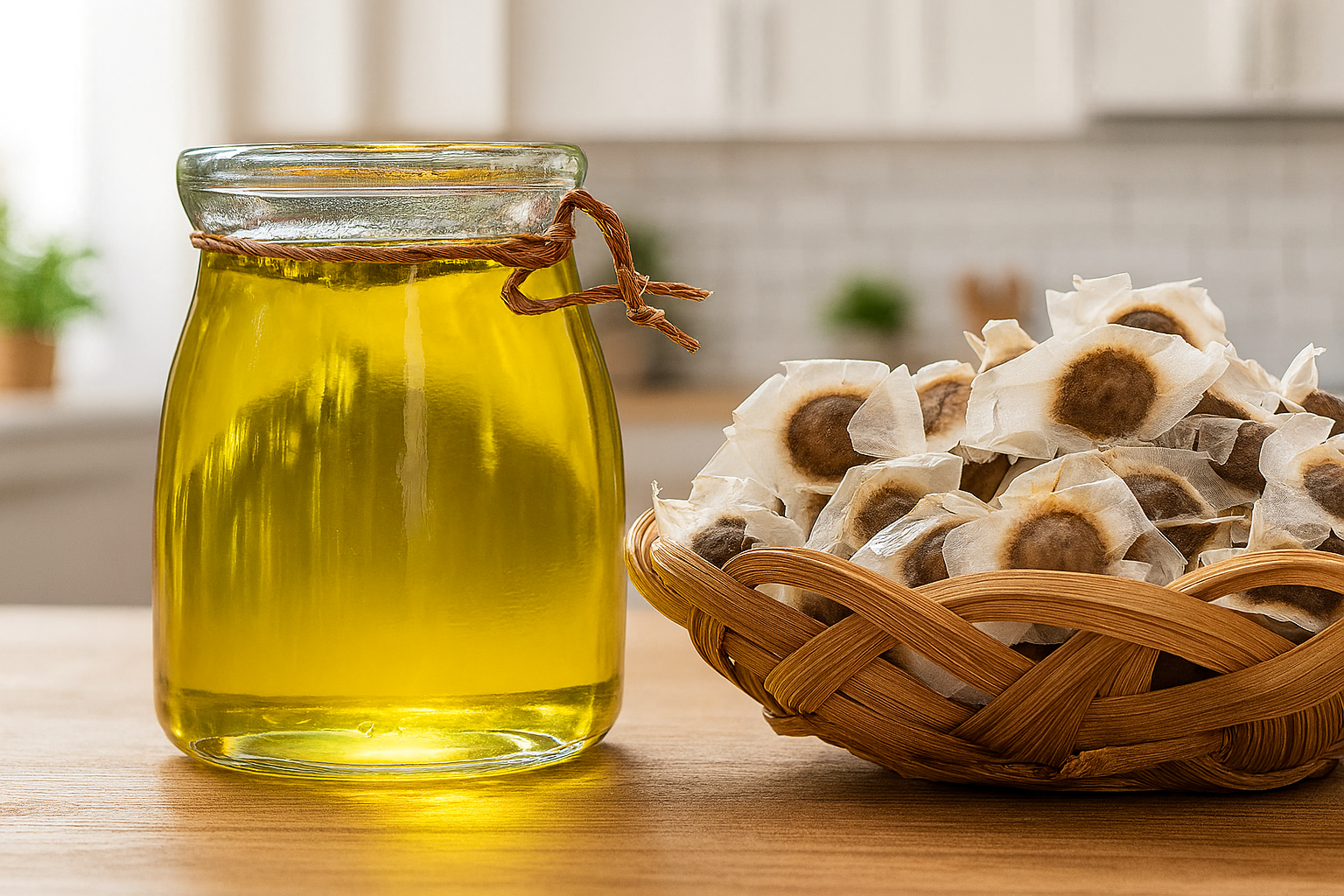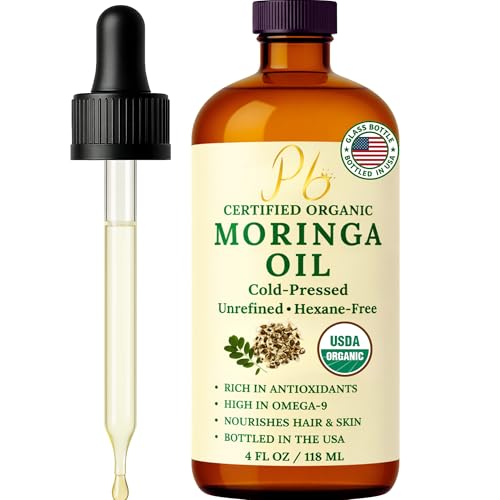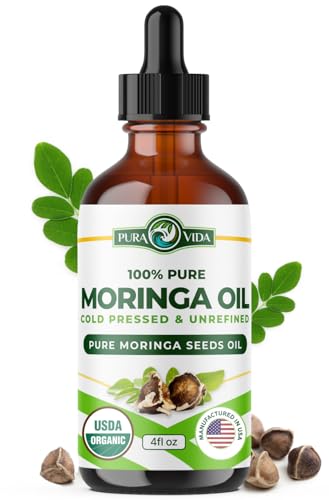The Ancient Oil Your Skin and Hair Have Been Craving
What if one simple oil could hydrate dry skin, tame frizzy hair, fight signs of aging, and even calm breakouts — all without a single synthetic ingredient?
That’s exactly what happened when I discovered moringa oil. I’d been bouncing between products for years, trying to find something that actually nourished my skin without making it greasy or irritated. And just when I was about to give up, a friend handed me a bottle of this golden-green oil from the seeds of the moringa tree — and told me it was known as “the tree of life.”
After a week of using it, my skin felt smoother, looked clearer, and had this glow I hadn’t seen in forever. I even started running it through the ends of my hair — and wow. No more straw-like texture.
In this post, I’ll show you exactly what makes moringa oil so powerful, the top 9 ways it can transform your skin, hair, and more, plus how to use it and what to watch out for. Ready to give your body what it’s actually asking for? Let’s get into it.
Top 9 Benefits of Moringa Oil (For Skin, Hair, and More)

If you’ve ever felt like your skin routine is too complicated or your hair never quite feels “right,” moringa oil might be the one product to simplify everything.
Why? Because it doesn’t just hydrate — it heals, protects, and revives from head to toe. Packed with over 90 nutrients, 40+ antioxidants, and a silky texture that absorbs fast, this oil is a quiet powerhouse that works behind the scenes to bring balance back to your skin, scalp, and even your nails.
Below are 9 of the most impressive, proven benefits of moringa oil — based on both science and personal experience. Some you’ll feel right away. Others work over time. But together? They make moringa oil a must-have.
1. Deeply Hydrates Skin Without Clogging Pores
Let’s start with what most of us want: real hydration. The kind that doesn’t just sit on the surface, but actually makes your skin feel soft, bouncy, and alive.


Moringa oil is rich in oleic acid, a fatty acid that’s known for its ability to penetrate deep into the skin’s layers. This means it doesn’t just create a film on top of your face — it gets inside and nourishes from the inside out.
What makes it even better? It’s non-comedogenic (translation: it won’t clog your pores). So if you’ve got dry or combination skin that also breaks out easily, moringa oil gives you that dewy moisture without the fear of waking up to new pimples.
From personal experience, it’s one of the few oils I can use in the morning that doesn’t make my face look shiny by lunch. It absorbs fast, leaves a soft glow, and plays well under makeup.
2. Smooths Fine Lines and Fights Signs of Aging
Moringa oil isn’t just about hydration — it’s about skin resilience. It’s packed with antioxidants like vitamin C, vitamin E, and zeatin, which help your skin fight off free radicals. These unstable molecules break down collagen and accelerate aging — but moringa oil puts up a solid defense.
Over time, consistent use can:
- Reduce the appearance of fine lines and wrinkles
- Improve skin tone and firmness
- Support collagen production
One thing I’ve noticed after using it regularly? My under-eye area looks smoother and brighter, and the little smile lines I used to obsess over seem way less noticeable. It’s not a facelift in a bottle — but it is a gentle, daily boost that helps your skin age gracefully.
3. Soothes Inflammation and Reduces Redness
If your skin tends to freak out — from weather, stress, new products, or even hormones — moringa oil can be your skin’s new BFF.
It contains cytokinins and other natural anti-inflammatory compounds that help calm irritation, reduce redness, and support skin healing. Whether you deal with eczema, rosacea, or the occasional rash or flare-up, moringa oil helps your skin feel safe again.
I’ve personally used it after sun exposure, harsh exfoliants, or just one of those “my face is mad” days — and it delivers instant relief. No burning. No stinging. Just a calming, nurturing feel that your skin immediately responds to.
4. Helps Fight Acne (Without Drying Out Your Skin)
This one’s a game-changer, especially if you’ve ever felt trapped in the cycle of using harsh acne treatments that leave your skin red, flaky, or tight.
Moringa oil has natural antibacterial and antimicrobial properties that can help fight off acne-causing bacteria. It’s not some chemical-laden spot treatment — it’s a gentle, nourishing oil that works with your skin’s natural barrier, not against it.
Because it’s rich in antioxidants and anti-inflammatory compounds, it also helps reduce the inflammation and redness that often come with breakouts. And since it doesn’t clog pores, it’s safe to use all over — not just as a spot treatment.
When I started using it during hormonal breakouts, I noticed fewer angry, swollen blemishes, and faster healing. Best part? It kept my skin hydrated through it all — no dryness or peeling.
5. Strengthens and Softens Hair
Moringa oil isn’t just a skincare star — it’s a total MVP for your hair too.
It’s packed with biotin, zinc, and amino acids that nourish the scalp and feed your hair follicles — helping reduce shedding and improve overall strength. If your hair is dry, brittle, frizzy, or constantly snapping when you brush, this oil adds softness and resilience in a way you’ll actually feel.
Here’s how I use it:
- As a scalp massage oil to boost circulation and moisture
- As a pre-shampoo treatment to protect hair before washing
- Or smoothed through the ends after styling to reduce frizz and add shine
Unlike heavier oils (looking at you, castor), moringa oil doesn’t weigh down your hair. It’s light, absorbs fast, and leaves your strands feeling clean — not greasy.
6. Protects Against Environmental Damage
Your skin and hair deal with a lot every day — from pollution and sun exposure to harsh weather and stress. Over time, all that wear and tear can lead to dullness, uneven tone, and even premature aging.
Moringa oil acts like a natural shield. It’s high in antioxidants that protect your skin and hair from free radical damage — kind of like a gentle force field. Plus, its emollient properties help reinforce your skin’s barrier, so it stays stronger and more resilient, even under daily stress.
I love using it in the mornings, especially before heading outside. It gives my skin a soft, dewy glow while also giving it that extra layer of protection — and yes, it pairs beautifully under sunscreen or makeup.
7. Promotes Wound Healing and Fades Scars
This is one of moringa oil’s lesser-known superpowers — but it’s a big deal if you’re dealing with scars, bug bites, cuts, or lingering post-acne marks.
Thanks to its high content of vitamin A, zinc, and amino acids, moringa oil helps stimulate tissue repair and speed up the healing process. That means less time for scabs to sit on your skin, and a better chance at healing without dark spots or scars.
I’ve used it on everything from minor razor nicks to small burns from my flat iron (yes, again) — and it helped reduce redness, itchiness, and even the leftover marks. It’s not as intense as a chemical treatment, but it’s a safe, soothing way to support your skin’s recovery naturally.
Bonus: if you’ve picked at a pimple and regret it (we’ve all been there), moringa oil can help calm the area and promote faster healing without irritation.
8. Softens and Strengthens Nails and Cuticles
If your nails are peeling, brittle, or your cuticles are cracked and dry, moringa oil can step in as your secret self-care weapon.
Its rich concentration of essential fatty acids and vitamins (especially E and B-complex) helps rebuild moisture in the nail bed, making nails look shinier, feel stronger, and grow healthier. And unlike thick, synthetic cuticle creams, moringa oil is lightweight and absorbs quickly.
Here’s how I use it:
- After applying it to my face, I rub any leftover into my fingertips and nails.
- For an extra boost, I massage a drop into each nail before bed — total game-changer.
Over time, your nails will start to split less, and your hands just look… polished, even without polish.
9. Balances Oil Production for Oily and Combination Skin
This one sounds backwards, but hear me out: adding oil to oily skin can actually make it less oily — if you use the right oil. And moringa is one of the best for that.
Here’s why: moringa oil mimics your skin’s natural sebum, which helps “trick” your skin into producing less oil. So instead of stripping your face with harsh cleansers and causing rebound greasiness, you’re feeding it the right kind of nourishment — and giving it permission to chill.
Since using moringa oil at night, I’ve noticed I wake up with a more balanced complexion — not overly dry, not shiny, just… calm. Especially if you’re dealing with that frustrating combo of dry cheeks and an oily T-zone, this oil can help bring everything into harmony.
How to Use Moringa Oil (For Face, Hair, Nails + More)
Moringa oil isn’t fussy. You don’t need a 10-step routine or fancy tools to use it. What makes it so easy to love is how versatile and low-maintenance it is — a few drops go a long way, and it plays well with almost everything.
Here’s how to make the most of it, depending on where you need it most:
For Your Face
- Daily Moisturizer: After cleansing and toning, warm 2–4 drops of moringa oil between your hands and press into slightly damp skin. Morning or night.
- Serum Booster: Mix a drop into your favorite serum or moisturizer to give it a fatty acid-rich boost.
- Under-Makeup Glow: Apply a drop under foundation for a smooth, radiant base without greasiness.
- Night Repair Oil: Use it as the final step in your nighttime skincare routine to seal in moisture and promote healing while you sleep.
💡 Pro Tip: Always apply oils to slightly damp skin — it locks in hydration much better.
For Hair
- Scalp Treatment: Warm a small amount and massage directly into the scalp before shampooing. Let it sit for 15–30 minutes to nourish follicles and calm dryness.
- Pre-Wash Oil Treatment: Apply from mid-lengths to ends, let it soak in, then wash as usual. This helps protect against moisture loss and breakage.
- Frizz Control Finisher: Rub a drop between your palms and smooth over dry hair to tame flyaways and add shine.
For Nails and Cuticles
- Massage a drop into each cuticle daily to soften and prevent cracking.
- Apply to bare nails for added strength and shine — especially after polish removal or gel treatments.
For Body
- After Shower Moisturizer: Apply while skin is still damp to lock in moisture (especially on elbows, knees, and heels).
- Spot Treatment: Use on scars, stretch marks, or dry patches that need extra love.
- Massage Oil: Moringa’s silky texture makes it perfect for massage — no stickiness, just smooth glide.
Precautions and Possible Side Effects
Moringa oil is one of those rare products that’s both effective and gentle — but that doesn’t mean you should dive in without a little care. Here’s what to keep in mind before you start slathering it everywhere:
1. Always Patch Test First
Even natural ingredients can cause irritation — especially if you have reactive or sensitive skin. Apply a small amount behind your ear or on the inside of your wrist, then wait 24 hours. If there’s no redness, itching, or burning, you’re probably in the clear.
2. Use Pure, Cold-Pressed Moringa Oil Only
All moringa oil is not created equal. Look for:
- 100% pure
- Cold-pressed
- Unrefined
- Ideally organic
Lower-quality or heavily processed oils may contain additives or lose their nutritional value — which kind of defeats the purpose.
3. Store It Properly
Moringa oil is stable, but it still needs a little TLC. Keep it in a cool, dark place (like a drawer or cabinet), and make sure the cap is always sealed tightly. Exposure to heat and light can make it go rancid faster.
If your oil starts smelling “off” or sour, it’s probably time to toss it.
4. Not Recommended for Internal Use (Unless It’s Food-Grade)
There is edible moringa oil (also called ben oil), but unless it’s clearly labeled food-grade, stick to using it topically. The versions made for skin and hair aren’t processed for safe digestion.
5. Consult Your Dermatologist If You’re Unsure
Especially if you’re pregnant, nursing, on medication, or managing a specific skin condition, check in with a professional before making moringa oil a regular part of your routine.
Final Thoughts: Is Moringa Oil Worth It?
If your skin feels tired, your hair feels dry, or your routine feels like a never-ending guessing game — moringa oil might be the quiet fix you didn’t know you needed.
It’s simple. It’s gentle. It’s packed with nutrients your body actually knows what to do with. And unlike so many “miracle” products, it delivers real results — without the drama, side effects, or synthetic overload.
From deep hydration and anti-aging support to clearer skin and healthier hair, moringa oil truly earns its “miracle tree” reputation. Just a few drops can go a long way toward making your skin feel nourished, protected, and more balanced than it’s felt in a long time.
If you’re looking for a natural, multi-tasking oil to upgrade your self-care game — moringa oil’s absolutely worth a spot on your shelf.


Join the 7‑Day “Better Gut” Plan
Pop in your email and we’ll send Lesson 1 + the printable list.




